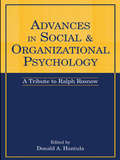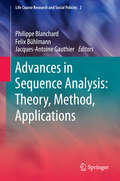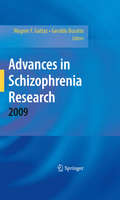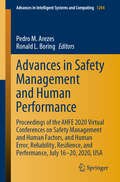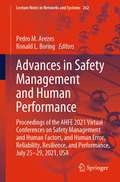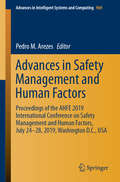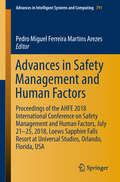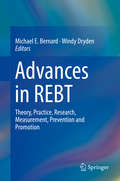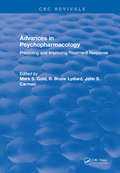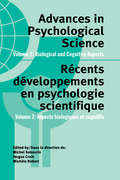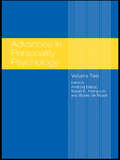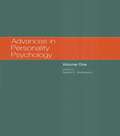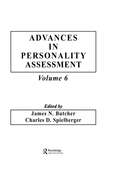- Table View
- List View
Advances in Social and Organizational Psychology: A Tribute to Ralph Rosnow
by Donald A. HantulaThis new volume is a collection of thought-provoking essays on the current state of social and organizational psychology. The topics range from data analysis and interpretation, to research ethics, to theoretical issues, to an examination of psychological epistemology and theory. The book is divided into three sections. The first section, focuses on Ralph Rosnow’s greatest contribution to psychology, advancing our knowledge of the methods and ethics of research. This section introduces refinements in research methodology, ethical issues in the conduct of psychological research, and the thorny problems of artifact in behavioral research. Four of the chapters in the next section cover topics in organizational psychology (consumer behavior, rumor in organizational contexts, decision making, and leadership) and three review social psychological topics (science and social issues, smiling, and human values). The final section is a collection of chapters on theory from three eminent scholars. This thought provoking finale raises epistemological questions for future generations to solve.The book is intended for graduate students and scholars in social, organizational, and consumer psychology, and related disciplines such as communication, management, marketing, management information systems, and sociology.
Advances in Social and Occupational Ergonomics: Proceedings of the AHFE 2018 International Conference on Social and Occupational Ergonomics, July 21-25, 2018, Loews Sapphire Falls Resort at Universal Studios, Orlando, Florida, USA (Advances in Intelligent Systems and Computing #792)
by Richard H. GoossensThis book reports on cutting-edge research on social and occupational ergonomics, presenting innovative contributions to the optimization of sociotechnical management systems related to organizational, policy, and logistical issues. It discusses timely topics related to communication, crew resource management, work design, participatory design, as well as teamwork, community ergonomics, cooperative work, and warning systems, and explores new work paradigms, organizational cultures, virtual organizations, telework, and quality management. The book also describes pioneering infrastructures implemented for different purposes such as urban, health, and enterprise, and examines the changing role of automated systems, offering innovative solutions that address the needs of particular populations. Based on the AHFE 2018 International Conference on Social and Occupational Ergonomics, held in Orlando, Florida, USA on July 21–25, 2018, the book provides readers with a comprehensive overview of the current challenges in both organizational and occupational ergonomics, highlighting key connections between them and underlining the importance of emotional factors in influencing human performance.
Advances in Social and Occupational Ergonomics: Proceedings of the AHFE 2019 International Conference on Social and Occupational Ergonomics, July 24-28, 2019, Washington D.C., USA (Advances in Intelligent Systems and Computing #970)
by Atsuo Murata Richard H.M. GoossensThis book reports on cutting-edge research on social and occupational ergonomics, presenting innovative contributions to the optimization of sociotechnical management systems related to organizational, policy, and logistical issues. It discusses timely topics related to communication, crew resource management, work design, participatory design, as well as teamwork, community ergonomics, cooperative work, and warning systems, and explores new work paradigms, organizational cultures, virtual organizations, telework, and quality management. The book also describes pioneering infrastructures implemented for different purposes such as urban, health, and enterprise, and examines the changing role of automated systems, offering innovative solutions that address the needs of particular populations. Based on the AHFE 2019 International Conference on Social and Occupational Ergonomics, held on July 24-28, 2019, Washington D.C, USA, the book provides readers with a comprehensive overview of the current challenges in both organizational and occupational ergonomics, highlighting key connections between them and underlining the importance of emotional factors in influencing human performance.
Advances in Sequence Analysis: Theory, Method, Applications (Life Course Research and Social Policies #2)
by Philippe Blanchard Felix Bühlmann Jacques-Antoine GauthierThis book gives a general view of sequence analysis, the statistical study of successions of states or events. It includes innovative contributions on life course studies, transitions into and out of employment, contemporaneous and historical careers, and political trajectories. The approach presented in this book is now central to the life-course perspective and the study of social processes more generally. This volume promotes the dialogue between approaches to sequence analysis that developed separately, within traditions contrasted in space and disciplines. It includes the latest developments in sequential concepts, coding, atypical datasets and time patterns, optimal matching and alternative algorithms, survey optimization, and visualization. Field studies include original sequential material related to parenting in 19th-century Belgium, higher education and work in Finland and Italy, family formation before and after German reunification, French Jews persecuted in occupied France, long-term trends in electoral participation, and regime democratization. Overall the book reassesses the classical uses of sequences and it promotes new ways of collecting, formatting, representing and processing them. The introduction provides basic sequential concepts and tools, as well as a history of the method. Chapters are presented in a way that is both accessible to the beginner and informative to the expert.
Advances in School Psychology: Volume 8 (Psychology Revivals)
by Thomas R. Kratochwill Stephen N. Elliott Maribeth GettingerOriginally published in 1992, this title is the last in a series of books on school psychology. It contains diverse contributions relevant to school psychology, research, theory and practice at the time. Including chapters on alternative intervention strategies for the treatment of communication disorders, strategies for developing a preventive intervention for high-risk transfer children, a review of sociometry and temperament research, a review of the recent advances in research in training behavioral consultants at the time, and an overview of school-based consultation to support students with severe behavior problems in integrated education programs.
Advances in Schizophrenia Research 2009
by Geraldo Busatto Filho Wagner F. GattazSchizophrenia remains an important challenge to psychiatry, with its causes and underlying brain mechanisms yet to be fully revealed. Currently available treatments are neither universally effective nor without unwanted effects. These aspects, together with the high prevalence of schizophrenia, its often debilitating nature, and the associated family and social burden, make this mental disorder one of the most complex public health issues of our times. The purpose of the Advances in Schizophrenia Research series is to provide comprehensive periodic reviews of the wide range of research studies carried out around the world, with the dual purpose of solving the schizophrenia puzzle, and providing clues to new forms of treatment and prevention for this disorder. A special feature of the series is its broad scope, virtually encompassing all fields of schizophrenia research: epidemiology and risk factors; psychopathology; diagnostic boundaries; cognition; outcome and prognosis; pathophysiology; genetics; pharmacological and psychological forms of treatment and rehabilitation; community care; and stigmatization.
Advances in Safety Management and Human Performance: Proceedings of the AHFE 2020 Virtual Conferences on Safety Management and Human Factors, and Human Error, Reliability, Resilience, and Performance, July 16-20, 2020, USA (Advances in Intelligent Systems and Computing #1204)
by Pedro M. Arezes Ronald L. BoringThis book brings together studies broadly addressing human error and safety management from the perspectives of various disciplines, and shares the latest findings on ensuring employees’ safety, health, and welfare at work. It combines a diverse range of disciplines – e.g. work physiology, health informatics, safety engineering, workplace design, injury prevention, and occupational psychology – and presents new strategies for safety management, including accident prevention methods such as performance testing and participatory ergonomics. It reports on cutting-edge methods and findings concerning safety-critical systems, defense, and security, and discusses advanced topics regarding human performance, human variability, and reliability analysis; medical, driver and pilot error, as well as automation error; and cognitive modeling of human error. Further, it highlights cutting-edge applications in safety management, defense, security, transportation, process controls, and medicine. Gathering the proceedings of the AHFE 2020 International Conference on Safety Management and Human Factors and the AHFE 2020 Virtual Conference on Human Error, Reliability, Resilience, and Performance, held on July 16–20, 2020, USA, the book offers an extensive, timely, and multidisciplinary guide for researchers and practitioners dealing with safety management and human error.
Advances in Safety Management and Human Performance: Proceedings of the AHFE 2021 Virtual Conferences on Safety Management and Human Factors, and Human Error, Reliability, Resilience, and Performance, July 25-29, 2021, USA (Lecture Notes in Networks and Systems #262)
by Pedro M. Arezes Ronald L. BoringThis book provides readers with a timely snapshot of research and developments relating to human reliability, performance and safety analysis, and human error, risk and safety management in various industrial contexts, such as manufacturing, transportation and health. It combines a diverse range of disciplines, including work physiology, health informatics, safety engineering, workplace design, injury prevention, and occupational psychology, and presents new strategies for safety management, accident prevention at the workplace, performance testing and participatory ergonomics. It discusses issues related to automation, and strategies for a safer Human-Automation Interaction. Based on the proceedings of the AHFE 2021 International Conferences on Safety Management and Human Factors, and Human Error, Reliability, Resilience, and Performance, which were held virtually on July 25-29, 2021, from USA, the book offers an extensive and inspiring guide for both researchers and practitioners dealing with the topics of safety management, human error prevention, and integration of automation in the workplace.
Advances in Safety Management and Human Factors: Proceedings of the AHFE 2019 International Conference on Safety Management and Human Factors, July 24-28, 2019, Washington D.C., USA (Advances in Intelligent Systems and Computing #969)
by Pedro M. ArezesThis book discusses the latest findings on ensuring employees’ safety, health, and welfare at work. It combines a range of disciplines – e.g. work physiology, health informatics, safety engineering, workplace design, injury prevention, and occupational psychology – and presents new strategies for safety management, including accident prevention methods such as performance testing and participatory ergonomics. The book, which is based on the AHFE 2019 International Conference on Safety Management and Human Factors, held on July 24-28, 2019, Washington D.C., USA, provides readers, including decision makers, professional ergonomists and program managers in government and public authorities, with a timely snapshot of the state of the art in the field of safety, health, and welfare management. It also addresses agencies such as the Occupational Safety and Health Administration (OSHA) and the National Institute for Occupational Safety and Health (NIOSH), as well as other professionals dealing with occupational safety and health.
Advances in Safety Management and Human Factors: Proceedings of the AHFE 2018 International Conference on Safety Management and Human Factors, July 21-25, 2018, Loews Sapphire Falls Resort at Universal Studios, Orlando, Florida, USA (Advances in Intelligent Systems and Computing #791)
by Pedro Miguel ArezesThis book discusses the latest findings on ensuring employees’ safety, health, and welfare at work. It combines a range of disciplines – e.g. work physiology, health informatics, safety engineering, workplace design, injury prevention, and occupational psychology – and presents new strategies for safety management, including accident prevention methods such as performance testing and participatory ergonomics. The book, which is based on the AHFE 2018 International Conference on Safety Management and Human Factors, held on July 21–25, 2018, in Orlando, Florida, USA, provides readers, including decision makers, professional ergonomists and program managers in government and public authorities, with a timely snapshot of the state of the art in the field of safety, health, and welfare management. It also addresses agencies such as the Occupational Safety and Health Administration (OSHA) and the National Institute for Occupational Safety and Health (NIOSH), as well as other professionals dealing with occupational safety and health.
Advances in REBT: Theory, Practice, Research, Measurement, Prevention and Promotion
by Michael E. Bernard Windy DrydenThis authoritative volume commemorates six decades of Rational Emotive Behavior Therapy by assembling its current state of theory, practice, and research. Bedrock chapters on defining features, assessment and measurement, and empirical findings place REBT squarely in the cognitive-behavioral landscape, reinforcing its status as a significant therapeutic approach. The book’s palette of applications shows the flexibility and effectiveness of REBT in school, workplace, and other settings, with worried parents and “stuck” athletes, and as a foundation for brief interventions. And the survey of guiding principles and the evolution of the method by REBT founder Albert Ellis is a testament to its enduring clinical value. Included in the coverage: · A comparison of REBT with other cognitive behavior therapies. · The measurement of irrationality and rationality. · Empirical Research in REBT theory and practice. · Rational Emotive Behavior Therapy and the working alliance. · Brief interventions in Rational Emotive Behavior Therapy. · REBT and positive psychology. · Rational emotive behavior education in schools. Advances in REBT will be welcomed as a definitive reference across the REBT community: frontline clinicians, novices, trainees, students, and researchers. Seasoned practitioners looking to incorporate REBT into their repertoires will find it immensely helpful.
Advances in Rasch Analyses in the Human Sciences
by William J. Boone John R. StaverThis volume follows the publication of Rasch Analysis in the Human Sciences. This new book presents additional topics not discussed in the previous volume. It examines key topics such as partial credit analysis of data, common person linking, computing equating constants, investigating discrimination, evaluating dimensionality, how to better utilize Wright Maps, how to design tests and surveys using Rasch theory, and many more. The book includes activities which can be used to practice the theme of each chapter and to test the reader’s understanding of Rasch techniques. Beginning and ending with a conversation between two students, each chapter provides clear step-by-step instructions as to how to conduct an analysis using the chapter theme. The chapters emphasize applications for the beginner learning Rasch and provide guidance for composing a write-up of an analysis for a presentation, paper, thesis or report.This book explores in detail many important yet often rarely discussed topics in Rasch. With its easy-to-read language and engaging format it reaches a wide audience of scientists, clinicians, students, researchers and psychometricians, providing a valuable toolkit for practical users of Rasch analysis. – Dr. Eva Fenwick, Clinical Research Fellow, Singapore Eye Research Institute (SERI) Assistant Professor, Duke-NUS Medical School, Singapore It is an easy to read book and provides immediate guidance for those wishing to conduct a Rasch analysis. The “conversations” between students in each chapter provides a welcome introduction to each topic. – Prof. Maik Walpuski, University Duisburg-Essen, GermanyThe lessons learned in their first book are extended by providing insightful demonstrations of some of the more complex concepts and techniques used in applying Rasch models. – Dr. Michael R. Peabody, National Association of Boards of Pharmacy, Illinois, USAI am amazed with the ability of these authors to communicate complicated knowledge, and the ability to make this highly complicated knowledge accessible to new learners guiding every step of the way. Through this book we get important knowledge about techniques and the different areas of use for Rasch methods in the human sciences This is truly an important book for students and researchers. – Prof. Charlotte Ringsmose, Aalborg University, Denmark
Advances in Psychopharmacology: Improving Treatment Response
by Mark S. GoldThe book focuses on the prediction and optimization of pharmacological treatment of psychiatric patients. Topics covered include the importance of accurate psychiatric diagnosis, medical problems which can mimic psychiatric illness, and the interface between psychiatric illness and opiate addiction and alcoholism. Current literature on predicting responses to antidepressants, lithium, antipsychotics and antianxiety agents is summarized. This practical guide also offers details on the state-of-the-art uses of blood levels in psychiatric practice for each class of drugs as well as other useful information in tables, graphs and flow charts.
Advances in Psychology and Law: Volume 1 (Advances in Psychology and Law #1)
by Brian H. Bornstein Monica K. MillerThis first volume of an exciting annual series presents important new developments in the psychology behind issues in the law and its applications. Psychological theory is used to explore why many current legal policies and procedures can be ineffective or counterproductive, with special emphasis on new findings on how witnesses, jurors, and suspects may be influenced, sometimes leading to injustice. Expert scholars make recommendations for improvements, suggesting both future directions for research inquiries on topics and needed policy changes. Topics included in this initial offering have rarely been considered in such an in-depth fashion or are in need of serious re-thinking: Interrogation of minority suspects: pathways to true and false confessions. A comprehensive evaluation of showups. The weapon focus effect for person identifications and descriptions. The psychology of criminal jury instructions. Structured risk assessment and legal decision making. Children's participation in legal proceedings: stress, coping, and consequences. Sex offender policy and prevention. The psychology of tort law. Demonstrating the scope and rigor that will characterize the series, Volume 1 of Advances in Psychology and Law will interest psychology and legal experts as well as practicing psychologists, and will inspire fresh thinking as the two fields continue to interact.
Advances in Psychology and Law: Volume 2 (Advances in Psychology and Law #2)
by Brian H. Bornstein Monica K. MillerAs with its esteemed predecessor, this timely volume offers ways of applying psychological knowledge to address pressing concerns in legal procedures and potentially to reduce criminal offending. In such areas as interrogations, expert testimony, evidence admissibility, and the "death qualification" process in capital trials, contributors offer scientific bases for trends in suspect, witness, and juror behavior and identify those practices liable to impinge on just outcomes. Recommendations span a wide range of research, practice, and policy areas, from better approaches to assessment to innovative strategies for reducing recidivism. The interdisciplinary perspectives of these chapters shed salient light on both the reach of the issues and possibilities for intervening to improve the functioning of the justice system. Among the topics covered: #65533; The validity of pleading guilty. #65533; The impact of emotions on juror judgments and decision making. #65533; The content, purpose, and effects of expert testimony on interrogation practices and suspect confessions. #65533; A synthetic perspective on the own-race bias in eyewitness identification. #65533; Risk-reducing interventions for justice-involved individuals. #65533; Criminal justice and psychological perspectives on deterring gangs. As a means to spur research and discussion, and to inspire further collaboration between the fields, Volume 2 of Advances in Psychology and Law will interest and intrigue researchers and practitioners in law-psychology as well as practicing attorneys, trial consultants, and clinical psychologists.
Advances in Psychology and Law: Volume 4
by Brian H. Bornstein Monica K. MillerThe present volume consists of up-to-date review articles on topics relevant to psychology and law, and will be of current interest to the field. Notably, the majority of these topics are currently attracting a great deal of research and public policy attention in the U.S. and elsewhere, as evidenced by programs at the American Psychology-Law Society and related conferences. Topics for the present volume include: attitudes toward the police (Cole et al.), alibis (Charman et al.), hate crimes based on gender and sexual orientation (Plumm & Leighton), the role of gender at trial (Livingston et al.), neuroimages in court (Glen), intimate partner violence (Mauer & Reppucci), post-identification feedback (Douglass & Smalarz) and individual differences in eyewitness identification (Snowden & Bornstein), veterans’ wellbeing (Berthelot & Prager), and plea bargaining (Levett).
Advances in Psychology and Law: Volume 5 (Advances in Psychology and Law #5)
by Brian H. Bornstein Monica K. MillerThis volume consists of up-to-date review articles on topics relevant to psychology and law, and will be of current interest to the field. These topics are currently attracting a great deal of research and public policy attention in the U.S. and elsewhere and will be relevant to researchers, clinical practitioners, and policy makers. Topics include: attitudes toward police (Cole et al.), accuracy of memory for child sexual abuse (Goldfarb et al.), the use of interpreters in investigations (Goodman-Delahunty et al.), adjustment of former prisoners post-exoneration (Kirshenbaum et al.), psychological implications for gun policy (Pirelli et al.), ability to match people with images from ID cards and video (Rumschik et al.), judicial instructions on eyewitness evidence (Skalon et al.), social science of the death penalty (West et al.), and informant testimony (Wetmore et al.).
Advances in Psychology and Law (Advances in Psychology and Law #6)
by Brian H. Bornstein Monica K. Miller David DeMatteoThis edited volume presents nine new state-of-the-science chapters covering topics relevant to psychology and law, from established and emerging researchers in the field. Relevant to researchers, clinical practitioners, and policy makers, topics include discussions of rape and sexual assault, eyewitness identification, body-worn cameras, forensic gait analysis, evaluations and assessments, veteran’s experiences, therapeutic animals and wrongful convictions.
Advances in Psychology and Law: Volume 3 (Advances in Psychology and Law #3)
by Monica K. Miller Brian H. BornsteinThe latest entry in this noteworthy series continues its focus on psychological issues relating to legal and judicial matters, with sound recommendations for situational and system-wide improvement. Salient concerns are described both in areas where their existence is frequently acknowledged (juror impartiality, the juvenile justice system) and where they are rarely considered (Miranda warnings, forensic mental health experts). Authors describe differences between professional and lay concepts of justice principles--and the resulting disconnect between community sentiment and the law. Throughout these chapters, psychological nuances and their legal implications are made clear as they relate to lawyers, jurors, suspects, and victims. Included among the topics: · From the headlines to the jury room: an examination of the impact of pretrial publicity on jurors and juries. · Victim impact statements in capital sentencing: 25 years post-Payne. · Psychology and the Fourth Amendment. · Examining the presenting characteristics, short-term effects, and long-term outcomes associated with system-involved youths. · Indigenous youth crime: an international perspective. · An empirical analysis of law-psychology journals: who’s publishing and on what? As with the others in the series, this third volume of Advances in Psychology and Law will interest researchers in legal psychology and related disciplines (e.g., criminal justice) as well as practicing attorneys, trial consultants, and clinical psychologists.
Advances in Psychological Science, Volume 2: Biological and Cognitive Aspects
by Michel Sabourin Fergus Craik Michèle RobertThe chapters in this volume are the edited versions of invited addresses to the XXVI International Congress of Psychology held in Montréal in August 1996. As one major goal of the Congress was to promote communication among specializations in scientific psychology, the speakers were asked to survey their research area and present their own work in a way that would be accessible to their colleagues in other areas. Another purpose of the meeting was to bring researchers together from different parts of the world, reflecting their different approaches to the scientific study of mind, brain, and behavior. Consequently, the eminent researchers who have written the twenty-six chapters included in the present volume were drawn from universities and research institutes in North America, Europe, Japan, Russia, Israel, and New Zealand. The chapters cover a range of topics in human and animal experimental psychology. The first section deals with psychobiological processes - the interplay of body and mind in determining intelligence, stress, and pain. The next five chapters address current issues in neuropsychology and neuroscience, including the neural correlates of attention and vision. A third section looks at learning processes in humans and animals, and a fourth deals with a range of topics in perception and cognition. The final five chapters take a developmental perspective, presenting theoretical and empirical analyses of the acquisition of perceptual and cognitive abilities. Overall, the collection illustrates the growing trend to break down traditional barriers between areas of experimental psychology; there are many instances of profitable interactions between researchers studying aspects of behavior and those studying the biological bases of these behaviors. The twenty-six chapters give an excellent overview of current research in scientific psychology.
Advances in Psychodynamic Psychiatry
by César A. Alfonso Dr Richard C. Friedman Jennifer I. DowneyBringing together important articles from Psychodynamic Psychiatry, this volume shows how contemporary practitioners are using a multidimensional biopsychosocial approach to increase the robustness of clinical research and the effectiveness of patient care. Chapters review cutting-edge approaches to formulating anxiety and mood disorders, eating disorders, traumatic grief, substance use and addictive behaviors, obsessive–compulsive disorder, personality disorders, schizophrenia, somatic symptom disorders, and trauma and stressor-related disorders. Treatment of specific populations is addressed, including infants and parents, children, spouses of the chronically ill, survivors of intimate partner violence, criminal offenders, and the elderly. Featuring rich case illustrations, the book integrates psychoanalytic concepts with advances in knowledge about neuroscience, gene–environment interactions, and the physiological impact of adversity.
Advances in Psychiatry
by Afzal Javed Kostas N. FountoulakisThis book will be the newest edition on the series ‘advances in psychiatry’. The previous 3 volumes can be found online at http://www.wpanet.org/detail.php?section_id=10&content_id=660 . They were highly successful in covering a broad area of psychiatry from different perspectives and angles and by reflecting both specialized but also international and global approaches. This series have guaranteed quality therefore can be used by different scientific groups for teaching and learning and also as a means for fast dissemination of advanced research and transformation of research findings into the everyday clinical practice. There is already a body of readers anticipating the next volume.
Advances in Personality Psychology: Volume II (Advances in Personality Psychology)
by Andrzej Eliasz Sarah E. Hampson Boele De RaadThe second volume in the Advances in Personality Psychology series, this book presents an authoritative collection of works by leading experts in the field. It focuses on three of the major issues in personality psychology: personality, affect and arousal; personality and intelligence; and personality structure. The first part of the book seeks to analyse cognitive biases dependent on anxiety and the biological foundations of thought and action. It also looks at the influence of temperamental traits on reaction to traumatic events. In the second part, contributions consider the mutual relations between personality and intelligence, the similarities and differences between personality and intelligence, and the cognitive mechanisms of human intelligence and personality. The final part analyses personality structure across cultures and presents a model of personality relevant to situational descriptions. All the authors are experienced and renowned experts in the field of personality psychology. The volume incorporates critical reviews, bringing the reader up-to-date with key issues, and unique data from contemporary empirical research projects, reflecting the diversity and vigour of current work on personality psychology.
Advances in Personality Psychology: Volume 1 (Advances in Personality Psychology)
by Sarah E. HampsonIn the first volume of this new series, Sarah E. Hampson brings together a unique collection of critical reviews of key areas of personality psychology and integrative accounts of important work by internationally recognised experts in the field. Advances in Personality Psychology includes chapters on cross-cultural evidence for the Big-Five framework for personality description, type and trait approaches to understanding childhood personality, developments in psychometrics, the relationship between hostility and cardiovascular disease, and the connections between personality and emotions. In further chapters the view that personality cannot change in adulthood is challenged and the importance of environmental factors is revealed by an observational study of twins. This state-of-the-art volume will provide students, teachers and researchers of contemporary personality psychology with a highly valuable resource on recent developments in this area.
Advances in Personality Assessment: Volume 6 (Advances in Personality Assessment Series #Vol. 10)
by James N. Butcher Charles D. SpielbergerFirst published in 1987. Routledge is an imprint of Taylor & Francis, an informa company.
